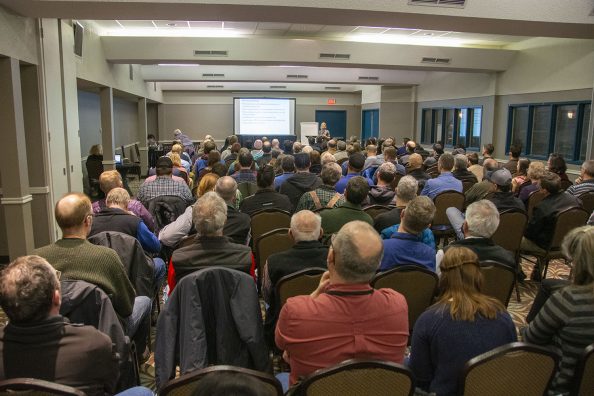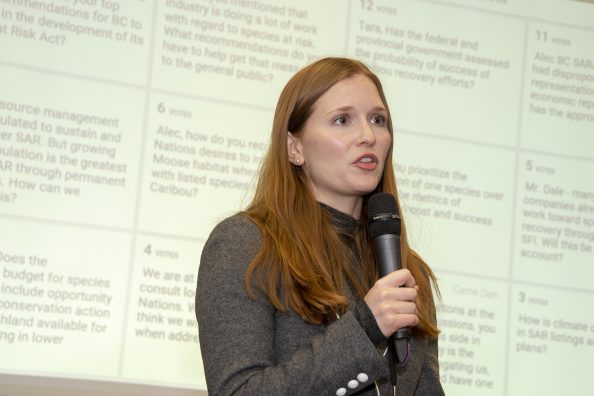 The Association of BC Forest Professionals (ABCFP) kicked off their annual conference yesterday with in-depth discussions on climate change and species at risk, prior to a plenary on the challenges and importance of planning for healthy and resilient forests. The three-day conference promises to be an outstanding event given the attendance of more than 550 delegates and high profile speakers such as Minister Doug Donaldson and Deputy Minister John Allan from the Ministry of Forests, Lands, Natural Resource Operations and Rural Development still to come.
The Association of BC Forest Professionals (ABCFP) kicked off their annual conference yesterday with in-depth discussions on climate change and species at risk, prior to a plenary on the challenges and importance of planning for healthy and resilient forests. The three-day conference promises to be an outstanding event given the attendance of more than 550 delegates and high profile speakers such as Minister Doug Donaldson and Deputy Minister John Allan from the Ministry of Forests, Lands, Natural Resource Operations and Rural Development still to come.
 Moderator Archie MacDonald (COFI) introduced the first discussion on BC’s efforts to develop a Species at Risk Act. First up, Dr. Tara Martin (University of BC) spoke of BC’s significant challenge, with 214 at risk species, and the failure of the current “single species” approach, where decades of study and planning take place prior to action on a single species of import—often too little, too late. According to Martin, the solution lies in a multi-species approach where areas and actions are prioritized based on a cost/benefit and probability of success analysis. In the few jurisdictions where this has been applied, the result is species recovery rates many fold times higher than the old approach.
Moderator Archie MacDonald (COFI) introduced the first discussion on BC’s efforts to develop a Species at Risk Act. First up, Dr. Tara Martin (University of BC) spoke of BC’s significant challenge, with 214 at risk species, and the failure of the current “single species” approach, where decades of study and planning take place prior to action on a single species of import—often too little, too late. According to Martin, the solution lies in a multi-species approach where areas and actions are prioritized based on a cost/benefit and probability of success analysis. In the few jurisdictions where this has been applied, the result is species recovery rates many fold times higher than the old approach.
 Dr. Darren Sleep (Sustainable Forestry Initiative) spoke of SFI’s commitment to sustainable forest management and the role well-managed forests can play in maintaining and creating habitat for multiple species. The means-to-the-end is SFI’s forest certification standard and its requirement that companies commit to continual improvement, as well as their species at risk pilot modules, the results of which will ultimately be integrated into the SFI standard. Sleep also spoke of the importance of promoting species success stories to build momentum for more of the same.
Dr. Darren Sleep (Sustainable Forestry Initiative) spoke of SFI’s commitment to sustainable forest management and the role well-managed forests can play in maintaining and creating habitat for multiple species. The means-to-the-end is SFI’s forest certification standard and its requirement that companies commit to continual improvement, as well as their species at risk pilot modules, the results of which will ultimately be integrated into the SFI standard. Sleep also spoke of the importance of promoting species success stories to build momentum for more of the same.
 Christine Leduc (EACOM) spoke of the trials and tribulations of Ontario’s species at risk legislation over the past decade and the opportunity for BC to learn from their mistakes. The most notable challenges were the single species approach, the lack of consideration for the existing regulatory framework and the unclear and burdensome authorization process (over and above the existing requirements for permit approval). Leduc recommends BC implement an ecosystem-based approach that starts with, and builds on, the existing policy framework, incorporates socio-economic assessments and ensures species assessments are based on up-to-date science and climate change considerations.
Christine Leduc (EACOM) spoke of the trials and tribulations of Ontario’s species at risk legislation over the past decade and the opportunity for BC to learn from their mistakes. The most notable challenges were the single species approach, the lack of consideration for the existing regulatory framework and the unclear and burdensome authorization process (over and above the existing requirements for permit approval). Leduc recommends BC implement an ecosystem-based approach that starts with, and builds on, the existing policy framework, incorporates socio-economic assessments and ensures species assessments are based on up-to-date science and climate change considerations.
Stepping in for Mark Zacharias was Alec Dale of Ministry of Environment, the lead ministry in BC’s pending Species at Risk Act. Dale noted an early lesson learned by government from their engagement process, which was the importance of “taking the time required to get it right”. As such, the BC government’s updated plan/timeline includes a public report on the feedback received to date (two-to-three weeks), a policy discussion paper in mid-March (followed by more public engagement)—and all being well,—legislation in the Spring of 2020.